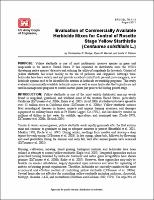Please use this identifier to cite or link to this item:
https://hdl.handle.net/11681/3801Full metadata record
| DC Field | Value | Language |
|---|---|---|
| dc.contributor.author | Mudge, Christopher R. | - |
| dc.contributor.author | Wersal, Ryan Michael, 1979- | - |
| dc.contributor.author | Nelson, Linda S. | - |
| dc.date.accessioned | 2016-03-16T16:05:26Z | - |
| dc.date.available | 2016-03-16T16:05:26Z | - |
| dc.date.issued | 2011-08 | - |
| dc.identifier.uri | http://hdl.handle.net/11681/3801 | - |
| dc.description | Technical Note | - |
| dc.description.abstract | Purpose: Yellow starthistle is one of most problematic invasive species in grass and rangelands in the western United States. It has expanded its distribution since the 1950’s threatening native species’ diversity and reducing the utility of rangelands for livestock. Control of yellow starthistle has relied heavily on the use of picloram and clopyralid. Although these herbicides have been widely used and provide excellent control both pre- and post-emergence, new herbicide options need to be identified for rotation in herbicide stewardship programs. This study evaluated commercially available herbicide mixes as well as some herbicides that typically are not used in management programs to control mature plants just prior to the bolting growth stage. | - |
| dc.publisher | Environmental Laboratory (U.S.) | - |
| dc.publisher | Engineer Research and Development Center (U.S.) | - |
| dc.relation | http://acwc.sdp.sirsi.net/client/en_US/search/asset/1002877 | - |
| dc.relation.ispartofseries | ERDC/EL; TN-11-3. | - |
| dc.subject | Yellow starthistle--Control | - |
| dc.subject | Herbicides--Weed control | - |
| dc.title | Evaluation of commercially available herbicide mixes for control of rosette stage yellow starthistle (Centaurea solstitialis L.) | - |
| dc.type | Report | en_US |
| Appears in Collections: | Technical Note | |
Files in This Item:
| File | Description | Size | Format | |
|---|---|---|---|---|
| EL-TN-11-3.pdf | 920.45 kB | Adobe PDF |  View/Open |